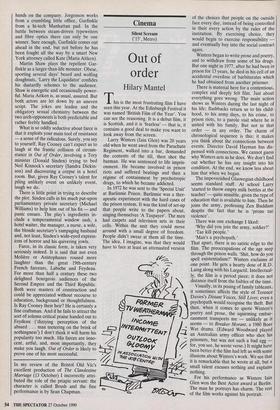Cinema
Out of order
Hilary Mantel
This is the most frustrating film I have seen this year. At the Edinburgh Festival it was named 'British Film of the Year'. You can see the reasoning. It is a debut film, it is Scottish, and it is 'fearless' — that is, it contains a good deal to make you want to look away from the screen.
Larry Winters (Iain Glen) was 20 years old when he went awol from the Parachute Regiment, walked into a bar, demanded the contents of the till, then shot the barman. He was sentenced to life impris- onment. He became involved in prison riots and suffered beatings and then a regime of containment by psychotropic drugs, to which he became addicted.
In 1972 he was sent to the 'Special Unit' at Barlinnie Prison. Barlinnie was a ther- apeutic experiment with the hard cases of the prison system. It was the kind of set-up that people write to the papers about, singing themselves 'A Taxpayer'. The men had carpets and television sets in their cells. Within the unit they could move around with a small degree of freedom. People didn't swear at them all the time. The idea, I imagine, was that they would have to face at least an attenuated version of the choices that people on the outside face every day, instead of being controlled in their every action by the rules of the institution. By exercising choice, they would begin to exercise responsibility and eventually buy into the social contract again.
Winters began to write prose and poetry, and to withdraw from some of his drugs. But one night in 1977, after he had been in prison for 13 years, he died in his cell of an accidental overdose of barbiturates which he had obtained from another prisoner.
There is material here for a contentious, complex and deeply felt film. Just about everything goes wrong. The main action shows us Winters during the last night of his life; flashbacks return us to his child- hood, to his army days, to his crime, to prison riots, to a parole visit where he is united with his family. But not in that order — in any order. The charm of chronological sequence is this: it makes you think about the connections between events. Director David Hayman has dis- pensed with connections. We cannot guess why Winters acts as he does. We don't find out whether he has any insight into his condition. At the end, we know less about him that when we began.
The impoverished Glaswegian childhood seems standard stuff. At school Larry `started to throw empty milk bottles at the teacher' — quite sensible, given the type of education that is available to him. Then he joins the army, professing Zen Buddism despite the fact that he is 'prone tae violence'.
There was one exchange I liked: `Why did you join the army, soldier?' `The kill people.'
`Man's a psychopath.'
That apart, there is no satiric edge to the film. The preoccupations of the age seep through the prison walls. 'Shit, how do you spell existentialism?' Winters exclaims at one point. He gets a hearty dose of R.D. Laing along with his Largactil. Intellectual- ly, the film is a period piece; it does not distance itself from the foibles of the time.
Visually, in its posing of family tableaux, it sometimes affects the style of Terence Davies's Distant Voices, Still Lives; even a psychopath would recognise the theft. But then, when it comes to quote Winters's poetry and prose, the squirming embar- rassment transports me — unlikely as it seems — to Breaker Morant, a 1980 Boer War drama. (Edward Woodward played an Australian army officer who shot his prisoners, but was not such a bad egg for, you see, he wrote verse.) It might have been better if the film had left us with some illusions about Winters's work. We see that it is remarkable that he wrote at all, but a small talent excuses nothing and explains nothing.
For his performance as Winters lain Glen won the Best Actor award at Berlin. The man he portrays has charm. The rest of the film works against his portrait.


































































 Previous page
Previous page